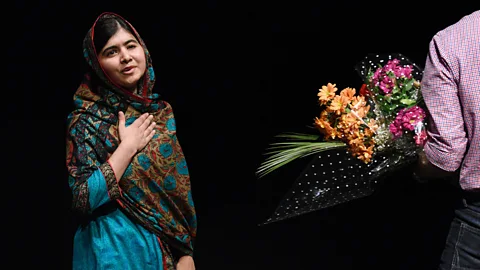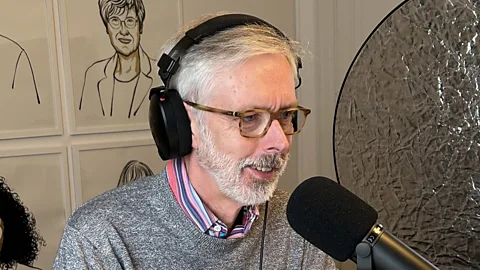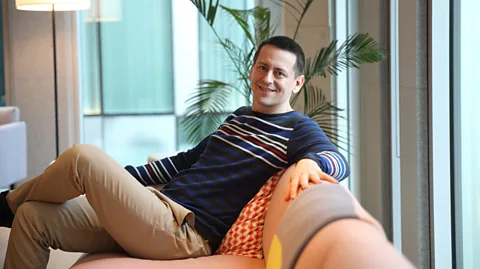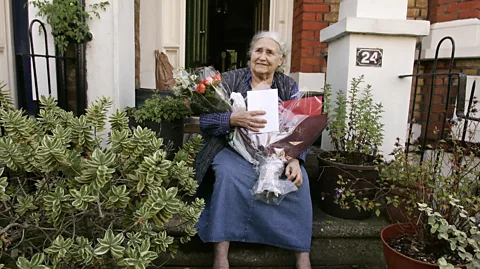 Getty Images
Getty ImagesAdam Smith has spent 18 years recording the moments after the world’s brightest minds receive a life-changing call from the Nobel Prize committee.
They might still be in bed when the call comes. Some are sitting at their desk at work, while others are mid-air on a transatlantic flight. But all Nobel Prize winners receive a phone call to break the big news to them.
Then, moments after they hang up, their phone rings again.
The man on the other end of the line is Adam Smith.
Since 2006, he has been one of the first voices that a new Nobel laureate will hear. In his role as chief scientific officer at Nobel Prize Outreach, Smith has spoken to almost every new prize winner just as reality is dawning. His job is to have the first conversation with new Nobel laureates to capture their excitement, reflections and surprise at receiving a prize.
It is a moment steeped in shock, elation or, very occasionally, disgruntlement at having been drawn away from an experiment.
The person who typically calls up laureates to break the initial news, the committee secretary or the head of the Royal Swedish Academy of Sciences, tends to change every few years or so. But Smith has been in post for 18 years – a continuity which puts him in a somewhat unique position.
“I’ve spoken to more [Nobel laureates] than anybody else has ever done,” says Smith, looking thoughtful as he considers the point. “I don’t know what it adds up to. I ought to stop and think about that sometimes.”
Smith intends these calls to be the start of a working relationship with the laureates, who will often travel to events around the world with Nobel Prize Outreach to speak with young scientists, engineers and students. The calls, which are recorded for the podcast Nobel Prize Conversations, make up one part of an archive of interviews with laureates he and his team have built up over the years.
 Nobel Prize Outreach
Nobel Prize OutreachIt’s not just the number of new Nobel laureates he speaks to that makes Smith’s job unusual, but the particular moment he catches them.
“In a perfect world, the news is breaking as I’m phoning, and they haven’t talked to anybody else. And sometimes that really does happen,” says Smith. “It’s a very nice point in time to catch somebody, when their guard is down a bit.”
But it doesn’t always go to plan. Sometimes, if the committee hasn’t been able to get through to a prize winner, Smith’s call is the first contact. He’s not supposed to break the news to them but his call from Stockholm, where the Nobel Foundation headquarters are, can be bit of a giveaway on the day of the announcement.
Sometimes things go even further off-script. Occasionally, neither the committee secretary nor Smith can reach the prize winner before the public announcement goes ahead. Peter Higgs, who shared the Nobel Prize in Physics in 2013 and was a famously private person, had gone out for lunch with no phone on the day of the announcement. He learned the news from a former neighbour, who stopped her car to congratulate him in the street as he was walking home in Edinburgh.
 Getty Images
Getty ImagesMost Nobel Prize winners have some suspicion that they might be in for success before they receive the news. Some might seek to avoid attention, like Higgs, while others have been known to keep a camera by their bed on announcement night each year, in the hopes of capturing the happy moment, says Smith.
“It’s very unusual to get a Nobel Prize without having some inkling that you might get a Nobel Prize, and yet it really isn’t something to wait for – it could really eat you up if you were waiting for it,” says Smith.
Emmanuelle Charpentier, who shared the 2020 Nobel Prize in Chemistry, describes being reminded “thousands of times” that the prize could well be in her future, after her pioneering work developing the gene-editing tool Crispr-Cas9.
One person who knew he was in the running was John Jumper, who shared 2024’s Nobel Prize in Chemistry for his work developing an AI tool, AlphaFold2, to predict the structures of almost all known proteins. “If you’re going to have developed AlphaFold, you’re going to be straightforward about life,” says Smith. “So in the interview he said, ‘I think I had a 10% chance.'”
But most are more circumspect about their hopes and expectations. “Even if [a laureate] thought it might happen at some point, there’s probably been quite a few years of that going on, and people have had false starts, and some of them have even had hoaxes played on them,” says Smith.
Despite the expectation, the build-up, the prank calls, and sometimes year after year of disappointment – the typical reaction is one of great surprise. “No matter how much they might have been told by people that it might come one day, it’s incredibly surprising when it happens,” says Smith. “They are genuinely amazed. It takes their breath away, I suppose, in almost all cases.”
That said, you really can’t generalise: once or twice, a new laureate has been quite perturbed by Smith’s call. Konstantin Novoselov, who shared the 2010 Nobel Prize in Physics for the discovery of graphene, and Arthur Ashkin who shared the same prize in 2018 for developing optical tweezers to move tiny objects using lasers, both gave Smith the same disgruntled reaction: “You mean I have to stop my experiment? I’m kind of busy.”
Sometimes, Smith might be expecting a tricky call but is pleasantly surprised.
When Doris Lessing won the 2007 Nobel Prize in Literature, she famously received the news after getting out of a taxi laden with bags of shopping. Her reaction to the reporter who broke the news to her was dismissive to say the least, waving him away and saying, “Oh, Christ,” before dropping her shopping to the street with a thump.
“I spoke to her very shortly afterwards,” says Smith. “I knew what had happened, and I thought, ‘This is not going to go well.'”
But in fact Smith was “tremendously happy” with the call. “We connected enough that she was happy, and she was enjoying the conversation, and that was one that I was very proud of, because I’d felt that she was going to be impossible.”
The call with Alice Munro, who won the 2013 literature prize, also caused Smith some trepidation beforehand. But the conversation went well, with Smith describing it as “thrilling” to find her a good interviewee.
“He thinks so fast, and he talks fast,” says Smith. “It began with the fact that his assistant had just been doing his hair – so we started pretty mundane, and by the end of the conversation we got to the end of the Universe, disappearing into supermassive black holes and re-emerging as the next universe. And you know, that’s a long way to travel in conversation.
“It did feel like you were holding on to the saddle, and just trying desperately not to fall off.”
 Getty Images
Getty ImagesAfter 18 years of making these calls, Smith says he still feels a little hesitant about disturbing the new laureates as they enjoy the glow of their win, especially if it is the middle of their night. “All this chasing of people – it’s not a very comfortable thing to do. Because, although the person will probably be happy when they get on the phone with you, you know you’re intruding.”
Smith describes the calls themselves as “very intense”. “I can feel elated or depressed, depending on whether it’s worked or not.
“You know absolutely whether you’ve connected with somebody, and they’re listening to you, or whether it’s just been a rather formulaic thing,” says Smith. “If I feel that we’ve connected, it’s wonderful. And of course I’m very happy. And if it’s been less than satisfactory, of course it’s sad. It’s a missed opportunity, and it only comes once.”
At the end of a busy week of announcements, Smith reflects on his role in taking a snapshot at a momentous time.
“In a way, this call that I make is just to say, ‘Hi, how are you? Congratulations, and what’s it like?’ And capturing them at this moment when life is changing.”



